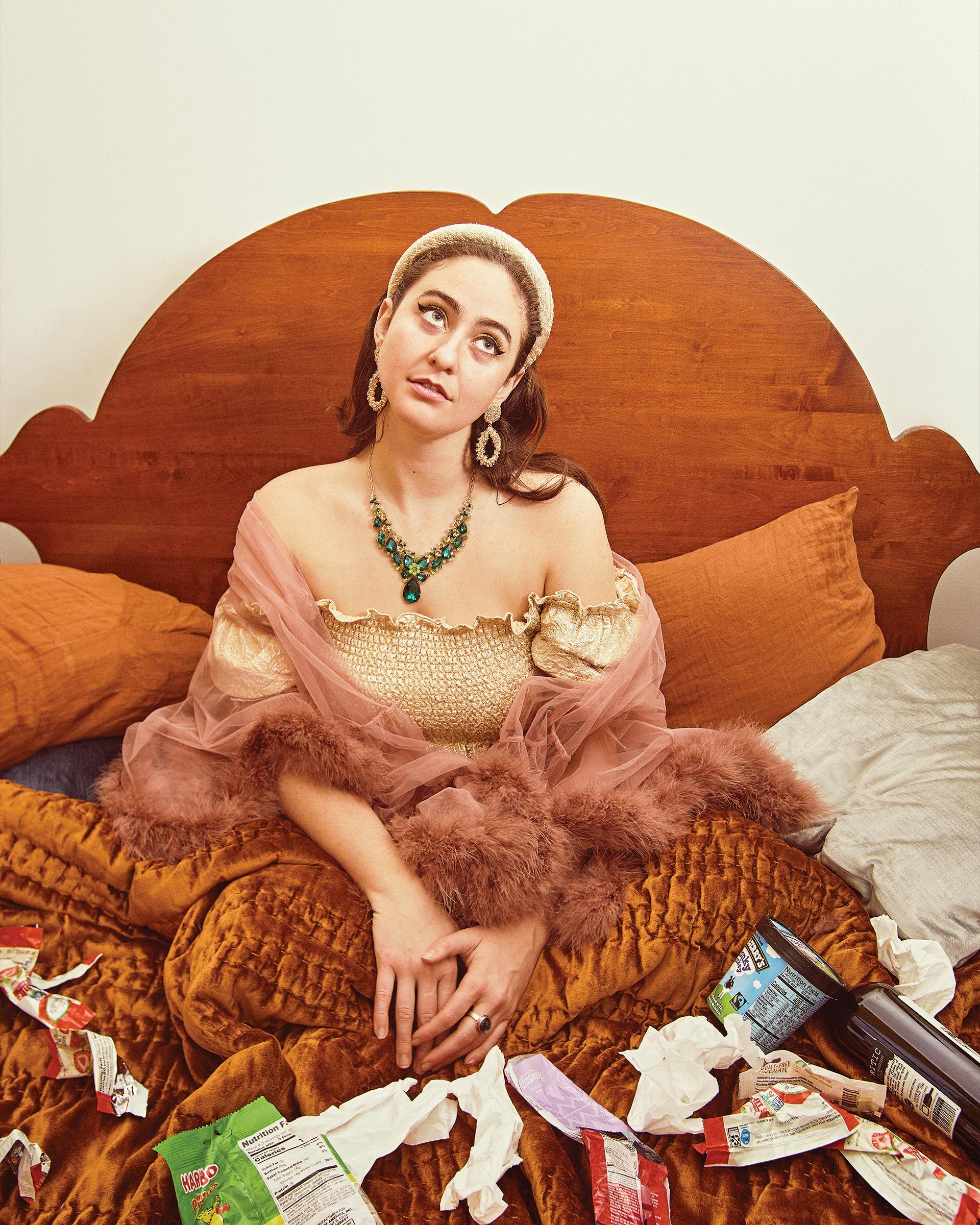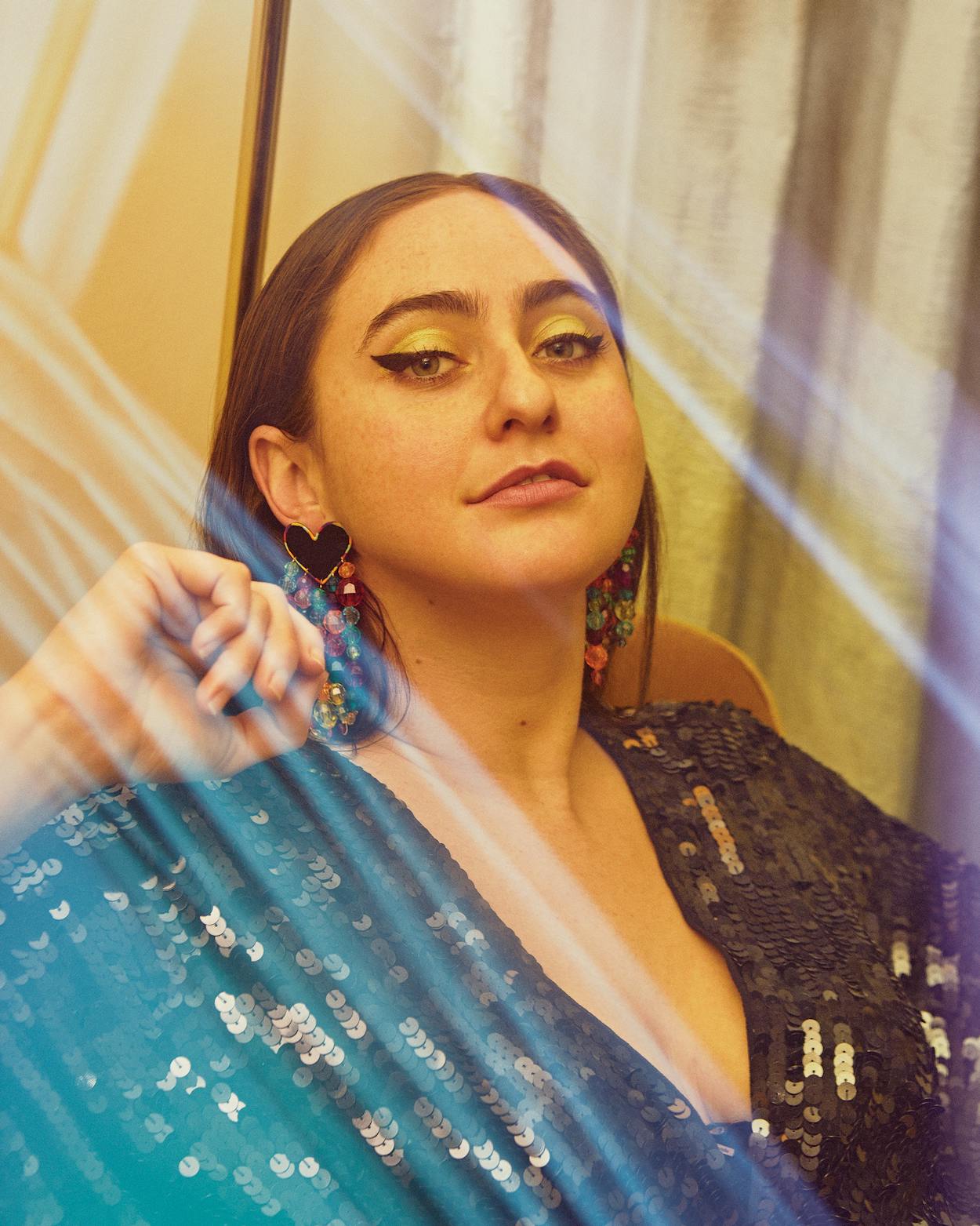Catherine Cohen and I met for our interview at a chicken wing restaurant in Edinburgh, Scotland, of all places, in late-summer 2019. I was there on vacation, but the comedian was in town for a nearly monthlong run at the venerable Edinburgh Fringe Festival. The annual event, which attracts millions from all over the world, has launched the careers of entertainers like Hugh Laurie and Phoebe Waller-Bridge.
It seemed poised to do the same for the 29-year-old Cohen. By then she’d already built a strong following for her facetious cabaret act The Twist? . . . She’s Gorgeous in New York City, where she currently resides. When we sat down over Scottish wings, Cohen had sold out every one of her Edinburgh shows and was in the process of adding one more, which would also sell out. She’d received rave reviews from prominent UK outlets, including the Guardian and the Evening Standard. By the time the festival drew to a close, she’d win the coveted Best Newcomer award and passionate fans across the pond.
I’d seen Cohen’s set the night before, in a packed room at the University of Edinburgh—a space that had been retrofitted as a black box theater—with a hundred other audience members. We laughed along with Cohen’s witty banter and catchy, self-deprecating lyrics: “Boys never wanted to kiss me / So now I do comedy.” Cohen describes her stage persona as a “self-obsessed millennial,” but the show’s vibe is decidedly more retro than that. Her signature look involves an exaggerated cat eye and red lips, and she’s typically dressed in sequins, lamé, or fake fur. She exudes a messy mid-century glamour that calls to mind a late-in-life performance from a sex-positive vaudeville star. Her voice matches this persona; she speaks quickly, occasionally slowing to draw out the vowels of certain words, constantly oscillating between, say, Mae West and one of the Kardashians.
In reality, Cohen is a less dramatic but equally charming version of her onstage counterpart. Energetic and playfully cynical, she’d been game when I suggested we take a tour of Edinburgh’s “haunted dungeons,” during which she pretended to be scared and cracked wise that our cheesy guide—a tall Brit who relied heavily on puns and donned a floor-length black cape—was “totally [her] type.” After the tour, at the wing place, she told me she was starving because some days she’s “so anxious about the show [that night] that I don’t eat until I’m about to pass out.” She read through a comically long list of sauce options and insisted we pick something from the spiciest available category (her suggestions: maple hot, hot and smooth, hot sweet buffalo, extra-hot ranch, hot mustard buffalo . . .). When I asked what she wanted out of a career, she told me, not at all joking, “I want to be a movie star.”
In Edinburgh, I was sure that was the direction Catherine Cohen was headed. Back home, the native Houstonian had already performed on Late Night With Seth Meyers and booked small but memorable roles in television comedies and a Netflix movie. Her poetry had grown increasingly popular online, and she’d soon start writing an advice column for W magazine. Cohen could easily translate her successful show into a one-hour comedy special, and it wasn’t hard to picture her helming an experimental sitcom—something akin to Broad City or PEN15—that critics would praise for being both hilarious and empowering. After that, it’d take but one charismatic turn in a well-received indie film to make Catherine Cohen the next Jenny Slate.
And then a pandemic happened, and a young artist whose career depended on traveling to perform in front of indoor crowds was spending most of her time in a New York apartment with little more than a minifridge, the internet, and her anxious, racing thoughts.

The next time I spoke with Cohen was more than a year later, in October 2020, via Zoom. “Oh my gaaaaaawd, it’s been ten million years,” she purred into her phone camera, playfully falling back onto the bed in her boyfriend’s Brooklyn guest room. (“It has no windows, which we love,” she added sarcastically.) She wasn’t wearing makeup and had on an old, decidedly unglamorous “Keep Austin Weird” shirt that she’d purchased on a high school trip. Her bushy brown hair, which she often embellishes with a large, sparkly headband, was pulled back into an unkempt bun.
Eight months into the pandemic, Cohen was promoting her new poetry book, God I Feel Modern Tonight: Poems From a Gal About Town (Knopf). Poetry has been an important part of Cohen’s comedy for years. Her works have long, rambling titles, with mostly lowercase letters—as if she’s frantically jotting down her thoughts with no time to think of mechanics—such as “poem I wrote after the woman at zara told me we actually don’t make that one in a large :::))).” They reflect the same laughable self-absorption that Cohen employs onstage.
“I guess I feel lucky that I had this book coming out,” Cohen said, before altering her voice into a singsong to indicate it was time for a joke, “because it’s like, ‘Okay, you can’t stop a book. You can’t stop people from reading.’ ” Little else from the past year has gone according to Cohen’s professional plan. She spent the first two months of 2020 traveling, having parlayed her success overseas into more shows in London, meetings in L.A., and a scheduled tour through Australia, all of which were canceled after the coronavirus hit. “The first week, I thought, ‘Oh, thank God, a chance to relax and restore my energy,’ ” she recalled to me in a familiar, ironically melodramatic tone. “And then it very quickly turned into panic attacks and crying.”
But Cohen adapted. She’s using this time at home to develop other projects, finally working on a long-discussed screenplay with several friends and fine-tuning a pitch for her own TV show. With her live acts on hold, she pivoted quickly on social media. She started hosting a weekly show on Instagram Live, a pandemic-friendly version of the Wednesday night residency she’d had at an East Village comedy club. She logged in from wherever she happened to be at the time—her West Village apartment, her boyfriend’s family’s home in the Berkshires—and performed songs on guitar, an instrument she first learned during her childhood in Houston, before a role in a school play diverted her creative energies from acoustic music to musical theater.
Onscreen, she bantered with guests, fellow rising comedy stars whom she invited on virtually. Without Henry Koperski, the pianist who usually performs alongside her in cabaret shows, Cohen used her boyfriend, the actor Brian Muller, as a prop, dressing him in little more than boxer briefs and requiring him to refill her martini. She wrote timely new music with lyrics like “If everyone’s a hypochondriac, then no one is. / Now the whole world is scared of getting sick. / Is it bad to say I feel at home?” For the most part, it was a success. New York magazine said Cohen’s flair for being “both the butt of the joke and the belle of the ball” translated well to the medium, while GQ cited her as someone who had “turned Instagram Live into quarantine’s best comedy club.”
Early on in lockdown, Cohen attracted thousands of viewers to her Instagram shows, but as the pandemic wore on into the summer, she said, “those numbers went down because eventually people got so sick of this apartment show. It’s like, ‘This was cute for a little bit.’ ”

Center Stage
Cohen took classes at New York City’s Upright Citizens Brigade improv theater, whose list of famous alumni includes Donald Glover, Kate McKinnon, and Aubrey Plaza, among other luminaries.
She also had a reckoning in June, after Twitter users recirculated a sketch video she had made in 2016 in which she sang, “My relatives had slaves / I’m verified on Twitter,” while holding onto a rope that was wrapped around the neck of her friend Chris Murphy, a Black man. Critics pointed out that she’d been 25 at the time of the video and should have known better than to use such violent imagery. Cohen publicly apologized, saying that because she had intended the video to be a satire of millennial performative activism and because it had garnered laughs, she’d thought it was fine. “How could I think it was okay to use slavery as a punchline and not realize that this was making a joke at the expense of hundreds of years of trauma?” she wrote. “Going forward, I’m going to read, listen, and educate myself further,” she added in the statement. “There’s a lot of work to do and this is just the start.”
Cohen paused her Instagram Live shows, and for the next month and a half devoted her account to promoting nonprofits and bail funds. She started a newsletter, My Sexy Little Email, that’s raised nearly $12,000 for a Black Lives Matter–related cause.
As the months went by, she found herself feeling depressed. To pull herself out of the funk, she consulted an energy healer, who told her, “I’m getting a sense that you have no will to live, but don’t worry.”
Later in the summer, she embarked on a cross-country road trip with Muller, first visiting Houston, which she left at eighteen to go to Princeton, and where her parents still live, in a leafy neighborhood near Rice University. Then the two meandered throughout the West, visiting national parks before returning to New York in September. Cohen posted new verse from the car, with lines like “i want to be famous for being the first person who never feels bad again.”
A few of the road trip poems made it into God I Feel Modern Tonight, a book Cohen had planned before the pandemic but which has been updated to reflect, as she puts it, “what happens when a gal about town can’t go about town anymore.” Some of the older poems were written years ago as part of her act. The recent ones strike a more somber note. “This is the first time that I’m sharing poems that aren’t just trying to be funny,” Cohen says. “I’m having a hard time being super jokey right now, so this has been a good outlet to be funny, but also, like, ‘Help.’ ”
In our current era, it’s hard to imagine any comedian getting away with being strictly “jokey,” and Cohen’s poetry strikes an appropriate balance between laughter and tears. Lines like “doctors really broke the mold when they invented antidepressants that make you feel worse” and “I’m finding quarantine to be an amazing time to revert to the basest, most vile version of myself I’ve worked years to outgrow” reveal an author who can poke fun at herself even while experiencing emotional pain.
That’s a potent and much-needed combination for this pandemical period, though Cohen is hopeful her work will still speak to audiences when the world opens back up. “I think when this all ends, there’s gonna be a really intense need for fun and fantasy and a bit of an escape,” she told me over Zoom. “I can’t wait.” If we’re lucky, we’ll have a whole crop of Catherine Cohen content we can enjoy in both good times and bad.
This article originally appeared in the March 2021 issue of Texas Monthly with the headline “Comedy of Errors.” Subscribe today.









